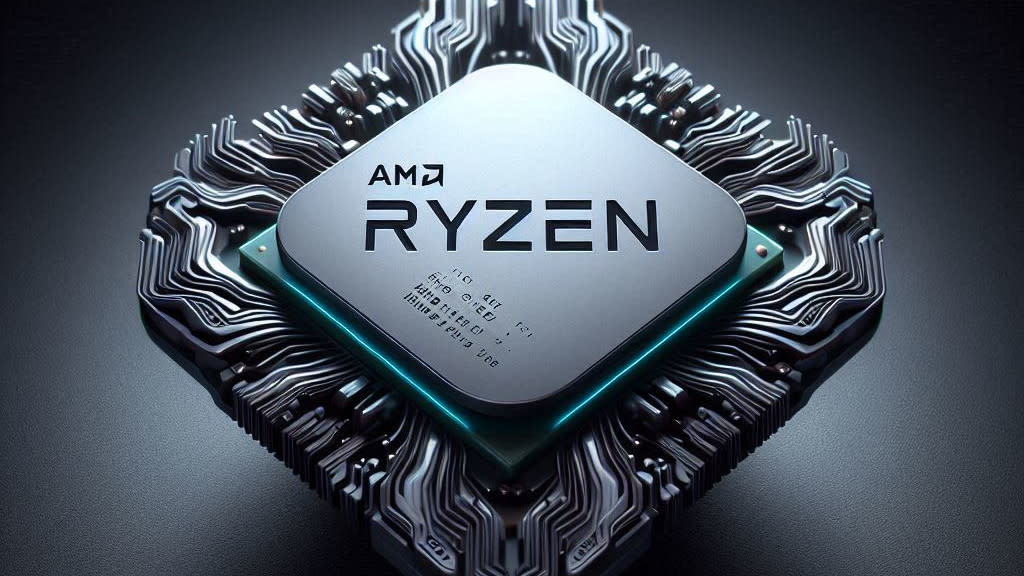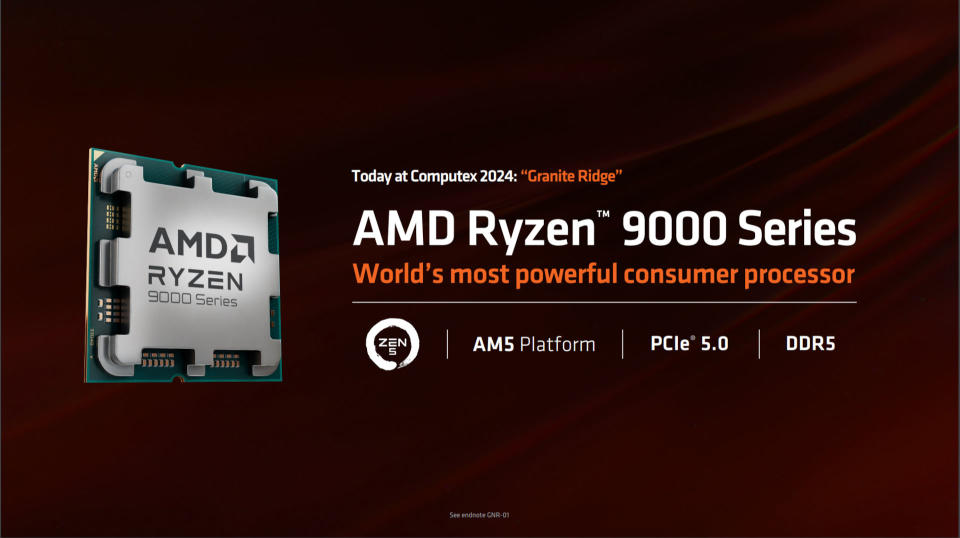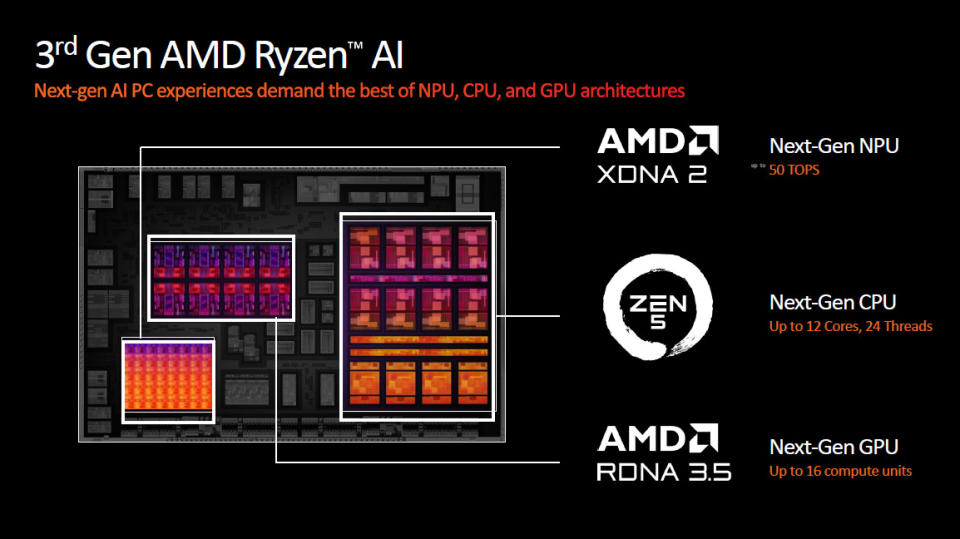AMD Zen 5: Everything we know about next-gen Ryzen CPUs

AMD officially revealed its next-gen “Zen 5” processors (CPU) at Computex 2024 in Taipei, Taiwan. The company took a two-pronged approach to its initial unveiling, with Ryzen AI 300 mobile chips for Copilot+ laptops and Ryzen 9000 desktop chips for PC builders interested in gaming, creation, and beyond.
Let’s take a look at the list of Zen 5 chips so far announced by AMD.
What is AMD Zen 5?

“Zen 5” represents AMD's next-generation desktop and mobile processors. It’s the name of the architecture used for Ryzen 9000 and Ryzen AI 300 chips, bringing a number of improvements over last-gen “Zen 4” hardware.
As was rumored in the lead-up to AMD’s official announcement, Ryzen 9000 desktop CPUs offer up to 16% better instructions-per-clock (IPC) as well as more cache. They use the AM5 socket just the same as Zen 4 chips, and AMD says it plans on supporting the chipset “through 2027 and beyond.” That's good news for builders who hate upgrading every couple of years.
New X870E and X870 chipsets for AM5 motherboards were unveiled, sporting support for PCIe 5.0, DDR5 memory, USB4 connectivity, and Wi-Fi 7 wireless internet.
AMD Ryzen 9000 desktop CPUs

AMD showed off four new Ryzen 9000 desktop CPUs at Computex 2024, including Ryzen 5, Ryzen 7, and Ryzen 9 options. AMD says its Ryzen 9 9950X is the “fastest consumer desktop processor” as of May 2024, though the sweet spot for most gamers and creators will likely be the Ryzen 7 9700X.
The Ryzen 7 9700X, like its Zen 4 Ryzen 7 7700X predecessor, has eight cores and 16 threads. The Zen 5 chip has 40MB of cache (compared to 32MB), as well as a slightly higher 5.5GHz boost frequency. It runs at a 65W base TDP, which is impressive considering the Ryzen 7 7700X sits at a 105W default TDP.
Looking at the flagship Ryzen 9 9950X, it too brings a larger cache compared to its Zen 4 predecessor. However, it runs at a similar 170W TDP with a 5.7GHz boost clock compared to the Ryzen 9 7950X.
Here’s a look at the specs that make up the chips.
AMD says that its new Ryzen 9000 desktop chips built on the Zen 5 architecture are expected to launch July 2024 for all customers.
AMD Ryzen AI 300 laptop CPUs

The other side of AMD’s Zen 5 Computex announcement involves new Ryzen AI 300 chips for laptops. This is the rumored “Strix Point” lineup of APUs, with Zen 5 CPU cores, RDNA 3.5 GPU Compute Units (CU), and XDNA 2 NPU.
AMD lays claim to the “world’s most powerful NPU” with 50 TOPS of power for local AI acceleration, and that claim will stand for the foreseeable future. Qualcomm’s Snapdragon X Elite and Snapdragon X Plus chips hit 45 TOPS, while even Intel’s next-gen “Lunar Lake” chips are expected to have a 45 TOPS ceiling.
This is especially important for Copilot+ features in Windows 11, which require an NPU with at least 40 TOPS. Indeed, laptops with AMD’s Ryzen AI 300 chips will be considered Copilot+ PCs just like the long list of Windows on ARM Copilot+ laptops revealed on May 20, 2024.
AMD announced two Ryzen AI 300 mobile APUs, each with the same NPU with 50 TOPS but otherwise different specs. The Ryzen AI 9 HX 370 is the flagship chip with 12 cores and 24 threads. AMD has split the cores between Zen 5 and Zen 5c, the latter being more efficient and slightly less powerful than the former. The Ryzen AI 9 HX 370 has a boost frequency up to 5.1GHz, a 28W TDP (configurable between 15W and 54W for manufacturers), and AMD Radeon 890M graphics.
The Ryzen AI 9 365 falls to 10 cores and 20 threads, with a 5.0GHz boost clock and the same TDP numbers. Its Radeon 880M GPU is slightly less powerful than the 890M due to it having four fewer CUs.
AMD Zen 5 release date speculation
As was rumored, AMD unveiled its new Zen 5 hardware at Computex 2024. AMD CEO Dr. Lisa Su kicked off the event with a keynote address that included news from third-party laptop manufacturers.
AMD clarified that Acer, ASUS, HP, Lenovo, and MSI are on board with AMD Ryzen AI 300 chips, and we can expect to see the new hardware in laptops later this year.
Acer plans on bringing the chips to its Swift lineup, while ASUS goes into more detail with ROG Zephyrus G16, ProArt P16/PX13, Zenbook S 16, Vivobook S 14/15/16, and TUF Gaming A14/A16 models announced.
HP has an OmniBook with Ryzen AI 300 in the works, and Lenovo plans on bringing the chip to Yoga, ThinkPad, and ThinkBooks brands. As for MSI, we can expect Stealth A16, Summit A16, Prestige A16, and Creator A16 laptops from the AI+ lineup.
